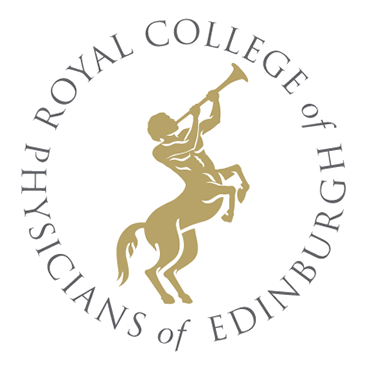
The Consultation Letters of Dr William Cullen (1710-1790) at the Royal College of Physicians of Edinburgh
[ID:180] From: Dr William Cullen (Professor Cullen) / To: [ADDRESSEE UNKNOWN] / Regarding: Merivale (Patient) / 13 August 1781 / (Outgoing)
Reply, 'For Mrs Merivale'. Includes directions for Mrs Merivale regarding the prevention and treatment of an unnamed disease, a form of croup, which has already taken two of her children.
- Facsimile
- Normalized Text
- Diplomatic Text
- Metadata
- Case
- People
- Places
Facsimile
There are 4 images for this document.
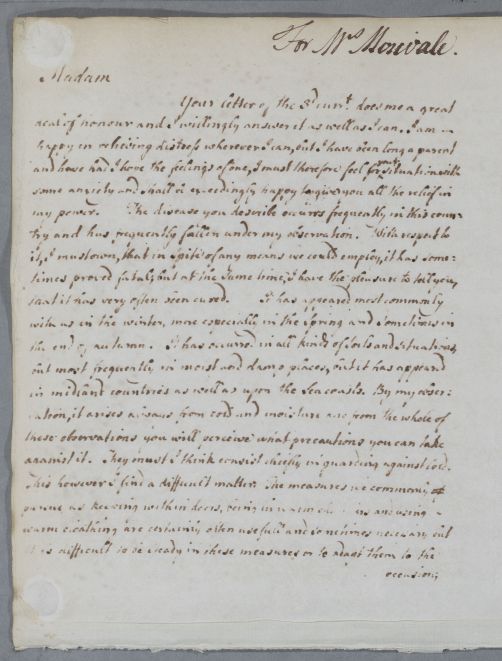
[Page 1]
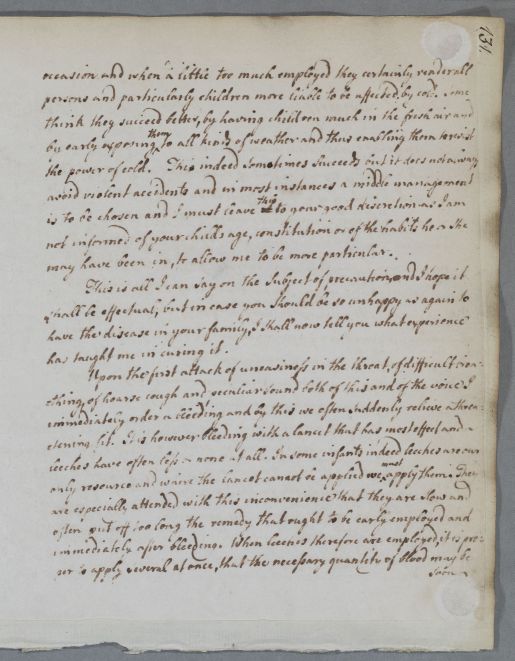
[Page 2]
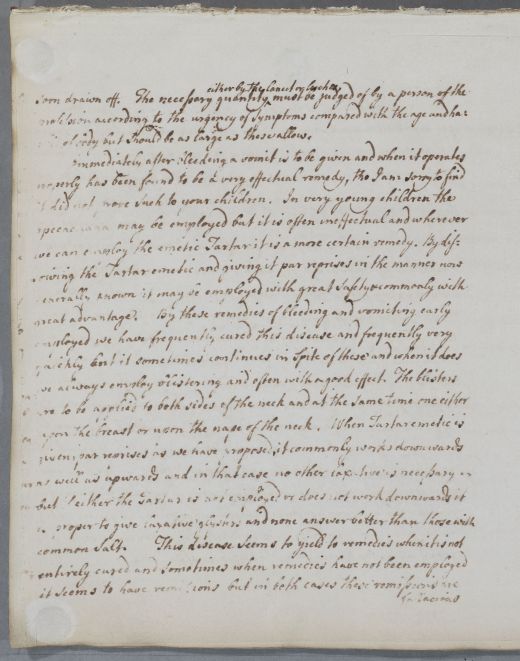
[Page 3]
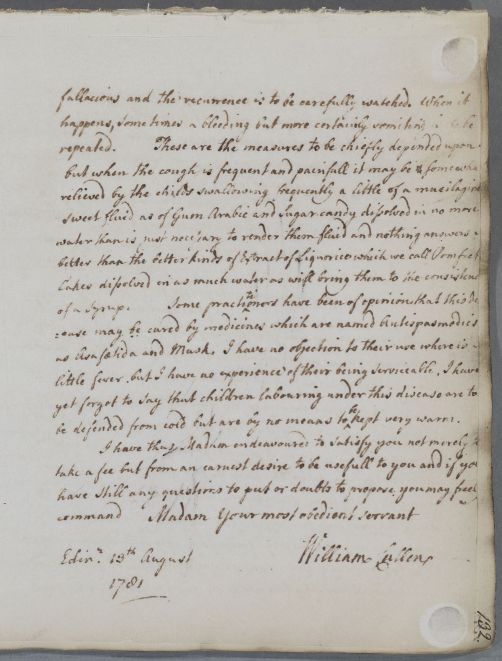
[Page 4]
Metadata
| Field | Data |
|---|---|
| DOC ID | 180 |
| RCPE Catalogue Number | CUL/1/1/14/66 |
| Main Language | English |
| Document Direction | Outgoing |
| Date | 13 August 1781 |
| Annotation | None |
| Type | Machine copy |
| Enclosure(s) | No enclosure(s) |
| Autopsy | No |
| Recipe | No |
| Regimen | Yes |
| Letter of Introduction | No |
| Case Note | No |
| Summary | Reply, 'For Mrs Merivale'. Includes directions for Mrs Merivale regarding the prevention and treatment of an unnamed disease, a form of croup, which has already taken two of her children. |
| Manuscript Incomplete? | No |
| Evidence of Commercial Posting | No |
Case
Cases that this document belongs to:
| Case ID | Description | Num Docs |
|---|---|---|
| [Case ID:1327] |
Case of Ann Merivale who seeks advice on how to take precautions against a disorder, a form of croup, which killed two of her children in order to stop it taking her surviving child. |
5 |
People linked to this document
| Person ID | Role in document | Person |
|---|---|---|
| [PERS ID:1] | Author | Dr William Cullen (Professor Cullen) |
| [PERS ID:155] | Patient | Merivale |
| [PERS ID:1] | Patient's Physician / Surgeon / Apothecary | Dr William Cullen (Professor Cullen) |
| [PERS ID:154] | Other | Mrs Ann Merivale |
Places linked to this document
| Role in document | Specific Place | Settlements / Areas | Region | Country | Global Region | Confidence |
|---|---|---|---|---|---|---|
| Place of Writing | Cullen's House / Mint Close | Edinburgh | Edinburgh and East | Scotland | Europe | certain |
Normalized Text
For Mrs Merivale.
Your letter of the 3d current does me a great
deal of honour and I willingly answer it as well as I can. I am -
happy in relieving distress whenever I can, but I have been long a parent
and have had I have the feelings of one, I must therefore feel for ↑your↑ situation with
some anxiety and shall be exceedingly happy to give you all the relief in
my power. The disease you describe occurs frequently in this coun¬
try and has frequently fallen under my observation. With respect to
it, I must own, that in spite of any means we could employ, it has some¬
times proved fatal; but at the same time, I have the pleasure to tell you,
that it has very often been cured. It has appeared most commonly
with us in the winter, more especially in the spring and sometimes in
the end of autumn. It has occurred in all kinds of soils and situations,
but most frequently in moist and damp places, but it has appeared
in midland countries as well as upon the sea coasts. By my obser¬
vation, it arises always from cold and moisture and from the whole of
these observations you will perceive what precautions you can take
against it. They must I think consist chiefly in guarding against Cold.
This however I find a difficult matter. The measures we commonly of
pursue as keeping within doors, being in warm chambers and using -
warm cloathing are certainly often usefull and sometimes necessary but
it is difficult to be steady in these measures or to adapt them to the
[Page 2]
occasion and when a little too much employed they certainly render all
persons and particularly children more liable to be affected by cold. Some
think they succeed better, by having children much in the fresh air and
by early exposing ↑them↑ to all kinds of weather and thus enabling them to resist
the power of cold. This indeed sometimes succeeds but it does not always
avoid violent accidents and in most instances a middle management
is to be chosen and I must leave it (↑this↑) to your good discretion as I am
not informed of your childs age, constitution or of the habits he or she
may have been in, to allow me to be more particular.
This is all I can say on the subject of precaution, and I hope it
shall be effectual, but in case you should be so unhappy as again to
have the disease in your family, I shall now tell you what experience
has taught me in curing it.
Upon the first attack of uneasiness in the throat, of difficult brea¬
thing, of hoarse cough and peculiar sound both of this and of the voice I
immediately order a bleeding and by this we often suddenly relieve a threa¬
tening fit. It is however bleeding with a lancet that has most effect and -
leeches have often less or none at all. In some infants indeed leeches are our
only resource and where the lancet cannot be applied we ↑must↑ apply them. They
are especially attended with this inconvenience that they are slow and
immediately after bleeding. When leeches therefore are employed, it is pro¬
per to apply several at once, that the necessary quantity of blood may be
[Page 3]
soon drawn off. The necessary quantity ↑either by the lancet or leeches↑ must be judged of by a person of the
profession according to the urgency of symptoms compared with the age and ha¬
bit of body but should be as large as these allow.
Immediately after bleeding a vomit is to be given and when it operates
properly has been found to be a very effectual remedy, tho I am sorry to find
it did not prove such to your children. In very young children the
ipecacuana may be employed but it is often ineffectual and wherever
we can employ the emetic Tartar it is a more certain remedy. By dis¬
solving the Tartar emetic and giving it par reprises in the manner now
[g]enerally known it may be employed with great Safety & commonly with
great advantage. By these remedies of bleeding and vomiting early
employed we have frequently cured this disease and frequently very
quickly but it sometimes continues in Spite of these and when it does
we always employ blistering and often with a good effect. The blisters
are to be applied to both sides of the neck and at the same time one either
upon the breast or upon the nape of the neck. When Tartar emetic is
[g]iven par reprises as we have proposed, it commonly works downwards
as well as upwards and in that case no other laxative is necessary -
but if either the Tartar is not employed or does not work downwards it
is proper to give laxative glysters and none answer better than those with
common salt. This disease seems to yield to remedies when it is not
entirely cured and sometimes when remedies have not been employed
it seems to have remissions but in both cases these remisions are
[Page 4]
fallacious and the recurrence is to be carefully watched. When it
happens, sometimes a bleeding but more certainly vomiting is to be
repeated. These are the measures to be chiefly depended upon
but when the cough is frequent and painfull it may be {illeg} somewhat
relieved by the childs swallowing frequently a little of a mucilagin[ous]
sweet fluid as of Gum Arabic and Sugar candy dissolved in no more
water than is just necessary to render them fluid and nothing answers
better than the better kinds of Extract of Liquorice which we call Pomfret
Cakes dissolved in as much water as will bring them to the consistenc[y]
of a Syrup. Some practi↑ti↑oners have been of opinion that this di¬
sease may be cured by medicines which are named Antispasmodics
as Asafœtida and Musk. I have no objection to their use where is -
little fever, but I have no experience of their being serviceable. I have
yet forgot to say that children labouring under this disease are to
be defended from cold but are by no means to ↑be↑ kept very warm.
I have thus Madam endeavoured to satisfy you not merely [to]
take a fee but from an earnest desire to be usefull to you and if yo[u]
have still any questions to put or doubts to propose you may freel[y]
command.
Edinburgh 13th August
1781
Diplomatic Text
For Mrs Merivale.
Your letter of the 3d currt. does me a great
deal of honour and I willingly answer it as well as I can. I am -
happy in relieving distress whenever I can, but I have been long a parent
and have had I have the feelings of one, I must therefore feel for ↑your↑ situation with
some anxiety and shall be exceedingly happy to give you all the relief in
my power. The disease you describe occurs frequently in this coun¬
try and has frequently fallen under my observation. With respect to
it, I must own, that in spite of any means we could employ, it has some¬
times proved fatal; but at the same time, I have the pleasure to tell you,
that it has very often been cured. It has appeared most commonly
with us in the winter, more especially in the spring and sometimes in
the end of autumn. It has occurred in all kinds of soils and situations,
but most frequently in moist and damp places, but it has appeared
in midland countries as well as upon the sea coasts. By my obser¬
vation, it arises always from cold and moisture and from the whole of
these observations you will perceive what precautions you can take
against it. They must I think consist chiefly in guarding against Cold.
This however I find a difficult matter. The measures we commonly of
pursue as keeping within doors, being in warm chambers and using -
warm cloathing are certainly often usefull and sometimes necessary but
it is difficult to be steady in these measures or to adapt them to the
[Page 2]
occasion and when a little too much employed they certainly render all
persons and particularly children more liable to be affected by cold. Some
think they succeed better, by having children much in the fresh air and
by early exposing ↑them↑ to all kinds of weather and thus enabling them to resist
the power of cold. This indeed sometimes succeeds but it does not always
avoid violent accidents and in most instances a middle management
is to be chosen and I must leave it (↑this↑) to your good discretion as I am
not informed of your childs age, constitution or of the habits he or she
may have been in, to allow me to be more particular.
This is all I can say on the subject of precaution, and I hope it
shall be effectual, but in case you should be so unhappy as again to
have the disease in your family, I shall now tell you what experience
has taught me in curing it.
Upon the first attack of uneasiness in the throat, of difficult brea¬
thing, of hoarse cough and peculiar sound both of this and of the voice I
immediately order a bleeding and by this we often suddenly relieve a threa¬
tening fit. It is however bleeding with a lancet that has most effect and -
leeches have often less or none at all. In some infants indeed leeches are our
only resource and where the lancet cannot be applied we ↑must↑ apply them. They
are especially attended with this inconvenience that they are slow and
immediately after bleeding. When leeches therefore are employed, it is pro¬
per to apply several at once, that the necessary quantity of blood may be
[Page 3]
soon drawn off. The necessary quantity ↑either by the lancet or leeches↑ must be judged of by a person of the
profession according to the urgency of symptoms compared with the age and ha¬
bit of body but should be as large as these allow.
Immediately after bleeding a vomit is to be given and when it operates
properly has been found to be a very effectual remedy, tho I am sorry to find
it did not prove such to your children. In very young children the
ipecacuana may be employed but it is often ineffectual and wherever
we can employ the emetic Tartar it is a more certain remedy. By dis¬
solving the Tartar emetic and giving it par reprises in the manner now
[g]enerally known it may be employed with great Safety & commonly with
great advantage. By these remedies of bleeding and vomiting early
employed we have frequently cured this disease and frequently very
quickly but it sometimes continues in Spite of these and when it does
we always employ blistering and often with a good effect. The blisters
are to be applied to both sides of the neck and at the same time one either
upon the breast or upon the nape of the neck. When Tartar emetic is
[g]iven par reprises as we have proposed, it commonly works downwards
as well as upwards and in that case no other laxative is necessary -
but if either the Tartar is not employed or does not work downwards it
is proper to give laxative glysters and none answer better than those with
common salt. This disease seems to yield to remedies when it is not
entirely cured and sometimes when remedies have not been employed
it seems to have remissions but in both cases these remisions are
[Page 4]
fallacious and the recurrence is to be carefully watched. When it
happens, sometimes a bleeding but more certainly vomiting is to be
repeated. These are the measures to be chiefly depended upon
but when the cough is frequent and painfull it may be {illeg} somewhat
relieved by the childs swallowing frequently a little of a mucilagin[ous]
sweet fluid as of Gum Arabic and Sugar candy dissolved in no more
water than is just necessary to render them fluid and nothing answers
better than the better kinds of Extract of Liquorice which we call Pomfret
Cakes dissolved in as much water as will bring them to the consistenc[y]
of a Syrup. Some practi↑ti↑oners have been of opinion that this di¬
sease may be cured by medicines which are named Antispasmodics
as Asafœtida and Musk. I have no objection to their use where is -
little fever, but I have no experience of their being serviceable. I have
yet forgot to say that children labouring under this disease are to
be defended from cold but are by no means to ↑be↑ kept very warm.
I have thus Madam endeavoured to satisfy you not merely [to]
take a fee but from an earnest desire to be usefull to you and if yo[u]
have still any questions to put or doubts to propose you may freel[y]
command.
Edinr. 13th August
1781
XML
XML file not yet available.
Feedback
Send us specfic feeback about this document [DOC ID:180]
Please note that the Cullen Project team have now disbanded but your comments will be logged in our system and we will look at them one day...

